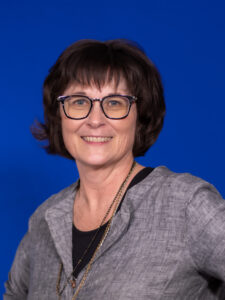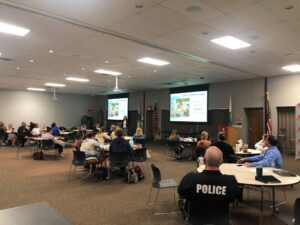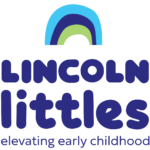Of course, a toddler cannot understand an intercom message about a tornado warning and an infant cannot march out of a building in case of a fire drill.
But a tweaked set of emergency messages and procedures used at Lincoln Public Schools is now arriving for Lincoln’s littlest folks.
The procedures are officially called “Standard Response Protocol” (SRP) and they are gradually getting woven into the early childhood culture – thanks to a partnership among the school district, the Lincoln-Lancaster County Health Department, the early childhood community and Lincoln Littles.
“We’re keeping the bones of SRP the same, as well as the same common vocabulary, but we’ve done some tweaking, using softer language,” said Kyle Poore, LPS Security Coordinator.
language,” said Kyle Poore, LPS Security Coordinator.
Nuanced changes were also necessary for a few procedures, explained Gina Egenberger, Public Health Emergency Response Coordinator for the Lincoln Lancaster Health Department. “You can’t expect infants and toddlers to listen to messages and respond so it’s important for staff members to have the skills to keep themselves and the children in their care safe.
Enter Lincoln Littles, creating a collaborative city-wide effort to bring emergency response training to early childcare in the community.
“I think Lincoln Littles had the ability to share more about the industry of early childcare, highlight how the needs are different,” said Suzanne Schneider, associate director of Lincoln Littles. “Child care facilities do not have the same resources as the public schools and security can be a concern.”
Lincoln Littles also had the capacity to bring a wide variety of appropriate groups together, Schneider explained. “This is trail blazing. I’m not sure we could find another community in the nation that is focusing on this kind of support and training for early childcare.”
LPS has long used SRP, a plain language protocol for emergency situations – such as weather, fire, intruders and other threats – using a specific, consistent vocabulary and five possible actions: Secure, Lockdown, Evacuate, Shelter and Hold.
Initially, Egenberger worked with early childhood facilities on SRP when she served as the Health Department’s Child Care Health Consultant.
Consultant.
But she recognized broader concerns.
“I remember when two prisoners broke out and stole a van near a childcare center. Staff were on the playground with children and saw police car lights blazing but had no idea about the danger.”
She and Poore knew they needed to bring SRP to the broader early childcare community and started organizing small group conversations. Then, somewhere along the way, Lincoln Littles stepped in to assist.
“Having that central piece really helped us get going,” Poore said. “We needed a middle buffer and Lincoln Littles gave us their full support.”
Eventually the partnership resulted in an expanded core group of support, then presentations, tabletop trainings, a variety of workshops, pre-written messages for communications purposes, and videos that match each type of drill.
Poore and Egenberger agreed early childcare does present unique challenges, especially since all early childcare does not look alike.
“There is everything from community-shared buildings to small businesses,” Poore explained. “Some of the larger centers already have limited protocol in place and want to look at improving. Some of the smaller centers have not had the time or resources to take a close look at all possible safety issues.”
Poore stressed that one of his biggest trials was understanding the difference in cultures between a school district and early childcare. “I needed to understand their world and it’s been an interesting learning curve.”
Major family and staff concerns also vary, Poore continued. “People in early childcare are more worried about disgruntled parents and domestic disturbances. We found out early on they had greater interest in the de-escalation piece of the protocol and how to calm down difficult situations.
Currently staff from half to two-thirds of all Lincoln’s early childcare centers have attended at least one training – as SRP procedures are still optional, not required.
The journey to date has been an interesting one.
“We have continued to ask teachers and administrators for feedback and have tried to adapt and adjust according to their needs,” Poore said. “I feel like we are making great progress, working closer toward consistency in expectations and procedures across all centers.”
They are now dreaming bigger dreams.
“We are starting to talk more about some sort of reunification team for early childcare – something that admittedly would look different than for schools,” Egenberger said.
Yet there are still lots of questions related to reunification, Poore noted, particularly because transportation is much tricker. “You can’t just move around little children as you do older students. You can’t push cribs down the street. You need lots of car seats. How do we identify a meeting place? Or do we need to bring re-unification to them?”
This effort has come far, Schneider continued. “We now have the solid beginnings of an emergency notification system in place, we have formed a team that meets monthly, we have developed a training plan and continue ongoing training.”
The conversation continues to develop – with Schneider, Poore and Egenberger all proud of their work.
“Other communities are looking to us, they want to mirror what we’re doing and now we’re hearing about statewide discussions,” Poore said. “But what has made this especially worthwhile is not just about the SRP, but about the incredible teamwork we’ve accomplished here.”
** As of 2/2/2025: State Sen. Margo Juarez has introduced LB162, the Child Care Safety And Security Act, for consideration by the Nebraska State Legislature. Juarez said, “Our childcares, both in-home and centers, are entrusted with keeping our children safe while parents are working. When they are not notified of emergencies in their area, whether it is fire or police activity, it puts our young children in jeopardy.”
The bill – based on the work of Lincoln Littles, Lincoln Public Schools and the Lincoln Lancaster Health Department – replicates that framework statewide so every Nebraska provider has the opportunity to protect our youngest children.
